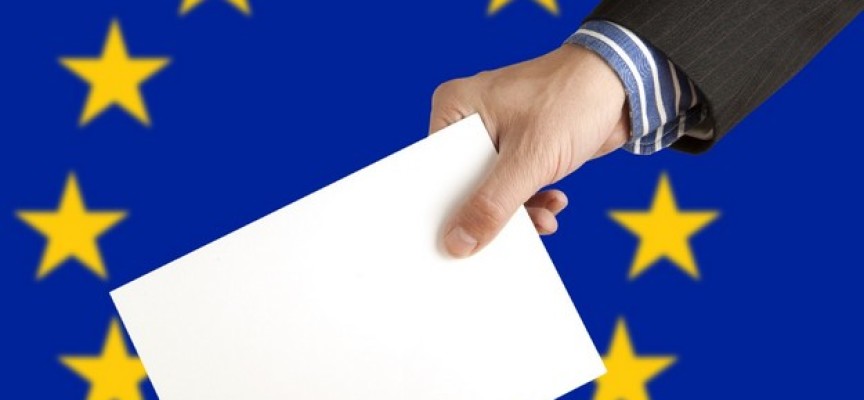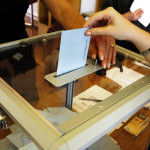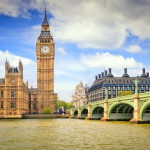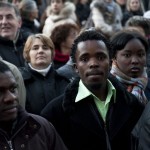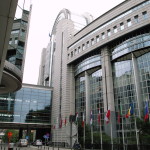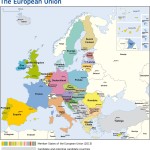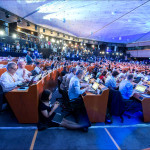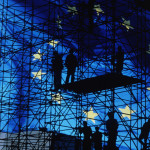A large majority of the citizens who participated in the European elections voted for pro-European candidates. In the years to come this will allow the European Parliament to continue its work for the common good of all Europeans with dedicated and competent women and men.
A matter of concern is the significant increase of support for parties which reject the project of European integration. A number of them were even able to secure a majority of votes in some Member States including France, Denmark and the United Kingdom. Some of these parties are not only populist but nationalistic and xenophobic. Such positioning is unacceptable for Christians and is a threat to the peaceful coexistence of the peoples of our continent.
The reasons for their electoral success are certainly diverse and it is still too early for a deeper analysis. Nevertheless, I believe that it will be even more important in the future to lead the debates on European issues that affect all citizens in an open and transparent way. This applies both to the elected politicians as well as to the media coverage of Europe and European politics. It may no longer be enough to make “Brussels” a scapegoat because of one’s own political discomfort. Europe is and remains, despite any criticisms on some specific points, a project of peace and reconciliation and as such is accompanied and supported positively by the Catholic Church.
The announcement of the results of the European elections is not the end but rather the beginning of the process of renewal at the top of the institutions of the European Union.
In the coming weeks, new political groups will be formed in the European Parliament and the Heads of State and Government will propose a name for the new President of the European Commission. He must then be elected and confirmed by the European Parliament together with the new European Commissioners. Finally, in the autumn of this year, the new President of the European Council will be chosen. It is my hope that the political parties and the Member States will come to an agreement on these new appointments without delay.
The programmes presented by the candidates will be a decisive element in the selection of the President of the European Commission. Prior to the European elections, in its election statement, COMECE had already set out proposals for what might be the important topics on the European agenda in the years to come. These include policies that make human dignity a holistic principle for action; a reorientation of the economy in line with the principles of the social market economy; trade agreements that serve the peoples of Europe, without losing sight of the situation on other continents, such as Africa; a dedicated fight against (especially youth) unemployment; a just and fair migration policy, which attempts to prevent disasters such as that of Lampedusa; energetic steps towards a policy of climate protection and comprehensive sustainability; the preservation of peace and security in Europe and in the neighbouring countries.
In the coming months these issues will form the basis for the continual work of COMECE in concert with the EU institutions in the framework of Article 17 of the TFEU (the “dialogue” clause). In the end it will depend on all citizens, not least committed Christians, whether the political work for achieving the common good in Europe succeeds. In Europe these efforts need to start again. I congratulate the newly elected and re-elected MEPs very warmly and wish them God’s blessing for their work. COMECE will accompany, in a critical and constructive manner, the European policy-making on the basis of the Social Doctrine of the Church and with the support of its prayers.
In occasione delle elezioni europee, la maggioranza dei cittadini che hanno partecipato allo scrutinio hanno accordato il loro voto a candidati favorevoli all’Europa. Questo permetterà al Parlamento di proseguire il suo lavoro per il bene di tutti i cittadini europei con uomini e donne dedicati e competenti.
Un motivo di preoccupazione è l’aumento, relativamente forte, di voti a favore di partiti che rifiutano il progetto di integrazione europea e che sono persino stati in grado di raccogliere la maggioranza dei voti in alcuni Stati membri come la Francia, la Danimarca e il Regno Unito. Alcuni di questi partiti non sono semplicemente populisti, ma nazionalisti e xenofobi, un atteggiamento che è inaccettabile per i cristiani e che minaccia la coesistenza pacifica dei popoli.
Le ragioni dello sviluppo di questi partiti sono certamente diverse ed è ancora troppo presto per un’analisi più approfondita. Tuttavia credo che in futuro sarà più importante che mai portare il dibattito sui problemi che toccano tutti i cittadini, in modo pubblico e trasparente. Questo vale anche per i politici toccati dalla copertura mediatica che si fa dell’Europa e della politica europea. Non è sufficiente fare di “Bruxelles” il capro espiatorio del nostro malessere politico. Qualsiasi siano le critiche su determinati punti, l’Europa è, e resta, un progetto di pace e di riconciliazione, ed è a questo titolo che questo progetto viene accompagnato e sostenuto con favore dalla Chiesa cattolica.
La diffusione dei risultati delle elezioni europee non costituisce la fine, ma piuttosto l’inizio di un processo di rinnovamento ai vertici delle istituzioni dell’Unione europea.
Nelle prossime settimane si formeranno nuovi gruppi politici in seno al Parlamento europeo, i capi di stato e di governo proporranno un nuovo Presidente della Commissione, che dovrà essere eletto e confermato dal Parlamento insieme alla nuova Commissione. Infine, in autunno, verrà scelto il nuovo presidente del Consiglio europeo. Spero che i Partiti politici e gli Stati membri raggiungano rapidamente un accordo su questi posti chiave.
Il programma con cui si presenteranno i candidati alla nomina di Presidente della Commissione sarà elemento decisivo. Prima delle elezioni europee la COMECE ha pubblicato una dichiarazione in cui ha messo sul tavolo una serie di proposizioni sulle grandi tematiche che segneranno gli anni a venire: politiche che facciano della dignità umana il principio della loro azione; un riorientamento dell’economia secondo i principi dell’economia sociale di mercato; accordi commerciali che servano ai popoli europei, ma che tengano tuttavia conto della situazione in altri continenti, come ad esempio l’Africa; una lotta decisa contro la disoccupazione, in particolare quella giovanile; una politica delle migrazioni giusta ed equa, che cerchi di impedire nel futuro catastrofi come quella di Lampedusa; misure energiche per una politica di protezione del clima e politiche globali di sostenibilità; il mantenimento della pace e della sicurezza in Europa e nei paesi vicini.
Nei prossimi mesi questi temi saranno alla base del lavoro della Comece con le istituzioni dell’Ue, nel quadro dell’articolo 17 del Tfue (clausola di Dialogo). Alla fine, la riuscita del lavoro politico in favore del bene comune europeo dipenderà da tutti i cittadini, in particolare dei cristiani impegnati. Questo lavoro in Europa ha bisogno di un nuovo inizio. Ci tengo a felicitarmi calorosamente con i deputati nuovi eletti o riconfermati, e auguro loro la benedizione di Dio sul loro lavoro. La COMECE continuerà ad accompagnare la politica europea in modo critico e costruttivo, sulla base della Dottrina sociale della Chiesa e ricordandola nella preghiera.
De grandes tâches attendent le Parlement nouvellement élu
Déclaration du Président de la COMECE, le Cardinal Reinhard Marx, sur le résultat des élections européennes. (www.comece.org)
A l’occasion des élections européennes, une grande majorité des citoyens ayant participé au scrutin, ont accordé leur suffrage à des candidats pro-européens. Cela permettra au Parlement de poursuivre son travail pour le bien de tous les européens avec des hommes et des femmes dévoués et compétents.
Un sujet de préoccupation est la relativement forte augmentation des votes en faveur de partis qui rejettent le projet d’intégration européenne et qui ont même été en mesure de réunir la majorité des votes dans certains États membres tels que la France, le Danemark et le Royaume-Uni. Certains de ces partis ne sont pas seulement populistes mais nationalistes et xénophobes, une attitude qui est inacceptable pour les chrétiens et qui menace la coexistence pacifique des peuples.
Les raisons du développement de ces partis sont certainement diverses et il est encore trop tôt pour une analyse plus approfondie. Néanmoins, je crois qu’il sera à l’avenir plus important que jamais de mener les débats sur les questions européennes qui affectent tous les citoyens, de façon publique et transparente. Cela vaut aussi bien pour les hommes politiques concernés que pour la couverture médiatique qui est faite de l’Europe et de la politique européenne. Il ne suffit pas de faire de «Bruxelles» le bouc émissaire pour notre malaise politique. Quelques soient les critiques sur certains points, L’Europe est et reste un projet de paix et de réconciliation, et c’est à ce titre que ce projet est accompagné et soutenu positivement par l’Église catholique.
La présentation des résultats des élections européennes ne constitue pas une fin en soi, mais bien plutôt le début d’un processus de renouvellement à la tête des institutions de l’Union européenne. Dans les prochaines semaines, les groupes politiques vont à nouveau se former au sein du Parlement européen, les chefs d’État et de gouvernement vont proposer un nouveau Président de la Commission, qui devra être élu et investi, ainsi que la nouvelle Commission, par le Parlement. Enfin à l’automne, un nouveau président du Conseil européen sera choisi. J’espère que les Partis politiques et les États s’accorderont rapidement sur les nominations à ces postes clés.
Le programme avec lequel se présenteront les candidats au poste de Président de la Commission sera un élément décisif. En amont des élections européennes, la COMECE a publié une déclaration dans laquelle elle a mis sur la table une série de propositions sur les grands thèmes qui vont marquer les années à venir: des politiques qui fassent de la dignité humaine au sens large le principe de leur action; une réorientation de l’économie selon les principes de l’économie sociale de marché; des accords commerciaux qui servent les européens, tout en tenant compte de la situation dans d’autres continents, comme en Afrique; un combat déterminé contre le chômage, en particulier celui des jeunes; une politique de migration juste et équitable, qui vise à prévenir à l’avenir des catastrophes telles que Lampedusa; des mesures énergiques pour une politique de protection du climat et des politiques globales de durabilité; la préservation de la paix et de la sécurité en Europe et dans les pays voisins.
Ces questions seront dans les prochains mois au cœur du travail que poursuit la COMECE, dans le cadre de l’article 17 du TFUE (clause de Dialogue), avec les institutions de l’UE. Au final, la réussite du travail politique en faveur du bien commun européen dépendra de tous les citoyens, en particulier des chrétiens engagés. Ce travail en Europe ne fait que commencer. Je tiens à féliciter très chaleureusement les députés nouvellement élus ou réélus, et je leur souhaite la bénédiction de Dieu pour leur travail. La COMECE continuera à accompagner la politique européenne de façon critique et constructive, en puisant dans la Doctrine sociale de l’Eglise et en la portant dans la prière.
Auf das neu gewählte Europaparlament warten große Aufgaben
Presseerklärung des ComECE-Präsidenten Reinhard Kardinal Marx zum Ergebnis der Europawahlen. (www.comece.org)
Bei den Europawahlen hat eine breite Mehrheit der Bürger, die sich an der Wahl beteiligt haben, ihre Stimme pro-europäischen Abgeordneten gegeben. Das wird dem Parlament in den kommenden Jahren erlauben, mit engagierten und kompetenten Frauen und Männern seine Arbeit für das Wohl aller in Europa fortzuführen.
Ein Anlass zur Sorge ist die teilweise große Zunahme an Stimmen für jene Parteien, die das europäische Integrationsprojekt ablehnen und die in einigen Mitgliedsstaaten wie in Frankreich, Dänemark und Großbritannien sogar die Mehrheit der Stimmen auf sich vereinigen konnten. Manche dieser Gruppierungen sind nicht nur populistisch, sondern nationalistisch und fremdenfeindlich, eine Haltung, die für Christen inakzeptabel ist und die das friedliche Zusammenleben der Menschen gefährdet.
Die Gründe für den Zuwachs dieser Parteien sind sicher vielfältig und es ist noch zu früh für eine tiefergehende Analyse. Ich glaube trotzdem, dass es in der Zukunft noch wichtiger sein wird, die Debatten über europäische Themen, die alle Bürger betreffen, öffentlich und transparent zu führen. Das gilt sowohl für die betroffenen Politiker als auch für die mediale Berichterstattung über Europa und die europäische Politik. Es darf nicht mehr ausreichen, „Brüssel“ zum Sündenbock für politisches Unbehagen zu machen. Europa ist und bleibt bei aller Kritik in einzelnen Punkten ein Projekt des Friedens und der Versöhnung und wird so von der katholischen Kirche positiv begleitet und unterstützt.
Das Vorliegen der Ergebnisse der Europawahl ist nicht das Ende, sondern der Beginn des Erneuerungsprozesses an der Spitze der Institutionen der Europäischen Union. In den kommenden Wochen werden sich im Europäischen Parlament die politischen Gruppen neu bilden, die Staats- und Regierungschefs werden einen neuen Kommissionspräsidenten vorschlagen, der vom Parlament, gemeinsam mit einer neuen Europäischen Kommission, gewählt bzw. bestätigt werden muss. Im Herbst wird schließlich ein neuer Vorsitzender des Europäischen Rates gewählt werden. Ich hoffe, dass sich die Parteien und Staaten rasch auf die Besetzung der Ämter verständigen werden.
Entscheidend für die Wahl des Kommissionspräsidenten wird das Programm sein, mit dem sich die Kandidaten präsentieren. Im Vorfeld der Wahlen hat COMECE in ihrem Wahlaufruf bereits Vorschläge für die großen Themen der kommenden Jahre auf den Tisch gelegt: eine Politik, die die umfassende Würde des Menschen zum Prinzip ihres Handelns macht; eine Neuorientierung der Wirtschaft an den Prinzipien der Sozialen Marktwirtschaft; Handelsabkommen, die den Menschen in Europa dienen, ohne den Blick für die Situation in anderen Kontinenten, etwa in Afrika zu verlieren; eine engagierte Bekämpfung der (Jugend-)Arbeitslosigkeit; eine gerechte und faire Migrationspolitik, die versucht, Katastrophen wie vor Lampedusa in Zukunft zu verhindern; energische Schritte für eine Politik des Klimaschutzes und der umfassenden Nachhaltigkeit; der Erhalt des Friedens und der Sicherheit in Europa und in den angrenzenden Ländern.
Diese Themen werden in den kommenden Monaten die Grundlage der kontinuierlichen Arbeit der COMECE im Rahmen des Art. 17 TAEU („Dialogklausel“) mit den EU-Institutionen bilden. Es wird schließlich von allen Bürgern, nicht zuletzt engagierten Christen abhängen, ob die politische Arbeit für das europäische Gemeinwohl gelingt. Diese Arbeit in Europa beginnt jetzt erst. Den wieder- und neugewählten Abgeordneten gratuliere ich sehr herzlich und wünsche ihnen Gottes Segen für ihre Arbeit. Die COMECE wird die europäische Politik mit Impulsen aus der Soziallehre der Kirche kritisch und konstruktiv begleiten und mit ihrem Gebet unterstützen.

